De Franse toneelschrijver Pierre Augustin Caron de Beaumarchais werd geboren op 24 januari 1732 in Parijs. Zie ook alle tags voor De Beaumarchais op dit blog.
Uit: Le barbier de Seville
“ROSINE
Mais, quelle idée avez-vous en insistant, Monsieur ? Est-ce encore quelque méfiance ?
BARTHOLO
Mais vous, quelle raison avez-vous de ne pas la montrer ?
ROSINE
Je vous répète, Monsieur, que ce papier n’est autre que la lettre de mon cousin, que vous m’avez rendue hier toute décachetée ; et puisqu’il en est question, je vous dirai tout net que cette liberté me déplaît excessivement.
BARTHOLO
Je ne vous entends pas.
ROSINE
Vais-je examiner les papiers qui vous arrivent ? Pourquoi vous donnez-vous les airs de toucher à ceux qui me sont adressés ? Si c’est jalousie, elle m’insulte ; s’il s’agit de l’abus d’une autorité usurpée, j’en suis plus révoltée encore.
BARTHOLO
Comment, révoltée ! Vous ne m’avez jamais parlé ainsi.
ROSINE
Si je me suis modérée jusqu’à ce jour, ce n’était pas pour vous donner le droit de m’offenser impunément.
BARTHOLO
De quelle offense parlez-vous ?
ROSINE
C’est qu’il est inouï qu’on se permette d’ouvrir les lettres de quelqu’un.”
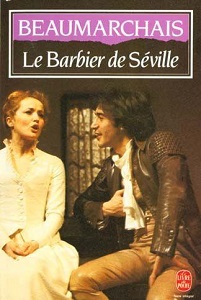
De Beaumarchais (24 januari 1732 – 18 mei 1799)
Cover
De Zwitserse dichter en schrijver Albin Zollinger werd geboren op 24 januari 1895 in Zürich. Zie ook alle tags voor Albin Zollinger op dit blog.
Uit: Pfannenstiel
“Zwei Freunde, Bildhauer, reisten zusammen von Paris nach der Schweiz zurück.
Sie waren nicht mehr jung; einige vierzig; dem Dunklen, zur Behäbigkeit neigenden, lichtete sich das Haar von seinem Wirbel aus, der andere, der ein Hüne war, trug noch die Mähne eines Jünglings. Beide blickten sehr jugendlich aus den Augen, nach deren Bläue beurteilt sie hätten Brüder sein können; die von Stapfer schienen verträumter, Krannig hatte den Schalk im Gesicht.
«Pass auf, es wird sein wie immer,» sagte er gegen das Scheibenglas, «wir kommen gleichsam in eine moosige Luft hinein, alles ist sehr traulich muschlig, die Dinge überraschen dadurch, dass sie noch etwas niedlicher sind als man sie sich vorsichtigerweise dachte; sogar die Alpen erstaunen auf den Abstand durch ihre geringe Höhe – wenn man freilich an sie herantritt . . . ! Die Seen erscheinen als Flüsse, und immer halten die Züge, kaum dass sie in Bewegung gekommen sind.»
«Ja,» antwortete der blonde Landsknecht, «und alles das ist gewiss sogar nicht wenig sinnbildlich für das Ganze. Aber du weisst, wir kommen nicht los davon; dieses sonderbare Ländchen beschäftigt uns mit seinen Mängeln ebenso wie mit seinen Zaubern. Was hab ich nicht Heimweh ausgestanden! Meist sah ich den Pfannenstiel in Blust und Amseln.»
«Es wird sich zeigen, ob die Luft unserer Arbeit zuträglich ist oder nicht. Ihr Gehalt an Säuerlichkeit ist zu fürchten, einer Säuerlichkeit, die den Bienenstock nicht verlässt. Mein Gott, schliesslich ist es Hochland, ein Hochland mit Hagebutten; die Kapellen geraten ein wenig spröder, die Ornamente schnörkliger – Bernini, nein, für dergleichen ist die Atmosphäre allzu gestopft, allzu frostig: Reisläufer sind daher herabgestiegen, Kerle immerhin, die die Welt veränderten, und das Hochland hat seine unergründlichen enzianblauen Wasser.»
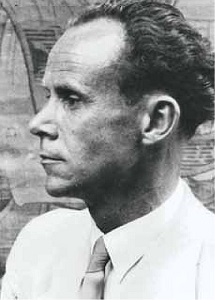
Albin Zollinger (24 januari 1895 – 7 november 1941)
De Engelse schrijfster Frances Moore Brooke werd geboren op 24 januari 1724 in Claypole, Lincolnshire. Zie ook alle tags voor Frances Brooke op dit blog.
Uit: The History of Emily Montague
« LETTER 2
To Miss Rivers, Clarges Street.
Quebec, June 27.
I have this moment your letter, my dear; I am happy to hear my mother has been amus’d at Bath, and not at all surpriz’d to find she rivals you in your conquests. By the way, I am not sure she is not handsomer, notwithstanding you tell me you are handsomer than ever: I am astonish’d she will lead a tall daughter about with her thus, to let people into a secret they would never suspect, that she is past five and twenty.
You are a foolish girl, Lucy: do you think I have not more pleasure in continuing to my mother, by coming hither, the little indulgencies of life, than I could have had by enjoying them myself? pray reconcile her to my absence, and assure her she will make me happier by jovially enjoying the trifle I have assign’d to her use, than by procuring me the wealth of a Nabob, in which she was to have no share.
But to return; you really, Lucy, ask me such a million of questions, ’tis impossible to know which to answer first; the country, the convents, the balls, the ladies, the beaux — ’tis a history, not a letter, you demand, and it will take me a twelvemonth to satisfy your curiosity.
Where shall I begin? certainly with what must first strike a soldier: I have seen then the spot where the amiable hero expir’d in the arms of victory; have traced him step by step with equal astonishment and admiration: ’tis here alone it is possible to form an adequate idea of an enterprize, the difficulties of which must have destroy’d hope itself had they been foreseen.
The country is a very fine one: you see here not only the beautiful which it has in common with Europe, but the great sublime to an amazing degree; every object here is magnificent: the very people seem almost another species, if we compare them with the French from whom they are descended.”
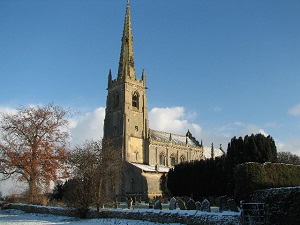
Frances Brooke (12 januari 1724 – 23 januari 1789)
St Peter’s Church in Claypole
De Engelse dichter en toneelschrijver William Congreve werd geboren in Bardsey op 24 januari 1670. Zie ook alle tags voor William Congreve op dit blog.
Uit:The Way of the World
“A Chocolate-house.
MIRABELL and FAINALL rising from cards. BETTY waiting.
MIRA. You are a fortunate man, Mr. Fainall.
FAIN. Have we done?
MIRA. What you please. I’ll play on to entertain you.
FAIN. No, I’ll give you your revenge another time, when you are not so indifferent; you are thinking of something else now, and play too negligently: the coldness of a losing gamester lessens the pleasure of the winner. I’d no more play with a man that slighted his ill fortune than I’d make love to a woman who undervalued the loss of her reputation.
MIRA. You have a taste extremely delicate, and are for refining on your pleasures.
FAIN. Prithee, why so reserved? Something has put you out of humour.
MIRA. Not at all: I happen to be grave to-day, and you are gay; that’s all.
FAIN. Confess, Millamant and you quarrelled last night, after I left you; my fair cousin has some humours that would tempt the patience of a Stoic. What, some coxcomb came in, and was well received by her, while you were by?
MIRA. Witwoud and Petulant, and what was worse, her aunt, your wife’s mother, my evil genius–or to sum up all in her own name, my old Lady Wishfort came in.
FAIN. Oh, there it is then: she has a lasting passion for you, and with reason.–What, then my wife was there?
MIRA. Yes, and Mrs. Marwood and three or four more, whom I never saw before; seeing me, they all put on their grave faces, whispered one another, then complained aloud of the vapours, and after fell into a profound silence.”
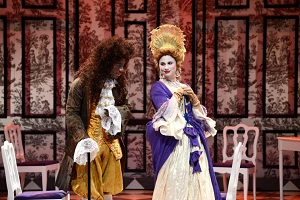
William Congreve (24 januari 1670 – 19 januari 1729)
Scene uit een opvoering in Boston, 2012
De Poolse dichter en schrijver Stanisław Grochowiak werd geboren op 24 januari 1934 in Leszno. Zie ook alle tags voorStanisław Grochowiak op dit blog.
The Fight Between Jacob and an Angel
You beat me with bread stone church
You are armed – like with two shields – with the wings
I am armed with the wrinkles on my forehead
Behind you there is fire hoplites and griffins
And behind me there is my grave
You beat me with aurora woman and jug
I beat you with the grave
Vertaald door Ewa Gladka
April (Fragment)
How blue eye you’ve got nearby woolly catkins
Vicar crossed himself, the priest felt offended
After all to Blessed Virgin was to be a prayer
And here the bishop’s arriving ladybug…
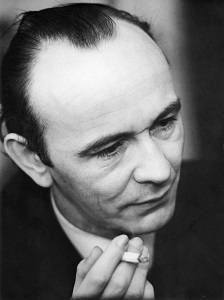
Stanisław Grochowiak (24 januari 1934 – 2 september 1976)
De Duitse schrijver en historicus Wolf von Niebelschütz werd geboren op 24 januari 1914 in Berlijn. Zie ook alle tags voor Wolf von Niebelschütz op dit blog.
Uit: Die Kinder der Finsternis
„Das ist ja“, sagte ein Fuhrmann, „der Seelenstier mit seiner Seelenkuh. Stellt euch vor, die Bauern haben ihm ein Mädchen gewählt, damit ihre Weiber verschont werden.“ – „Wie die Herrlichkeit, so die Geistlichkeit. Dafür beschlief der Baron eine Braut.“ – „Auf Bitten des hochzeitenden Paars immerhin, es ist sein Recht, das edle Blut breitet sich aus, und dem Ort werden die Zehnten erlassen. Was erlässt der Pfaff? Unsere Sünden. Und die seinen.“ – „Das meinst du. In Ortaffa ist ein Pfaffe gesteinigt worden mitsamt seiner Buhlschaft. Mein Bischof hat es gebilligt. Ei, was eine Sammlung Waffen!“
Im Schatten des Daches, der Herde gegenüber, saß der Hirt auf dem Wollfilz, breitete seine Dolche, sein Krummschwert, seine Gerätschaften aus und begann sie zu putzen. Die Fuhrleute umringten ihn; man erzählte sich vielerlei Neuigkeit. „Das neueste ist: die Häuser Cormons und Ortaffa haben sich geeinigt – ein Vertrag mit achtundzwanzig Siegeln! Ortaffa! Da geht der Böse um: alle Söhne, alle Töchter gestorben; und in Cormons geht der Gute um: alle fünf Söhne auf einen Tag ins Kloster; ich habe sie gekannt – blühende, edle Menschen! Was bleibt? In Ortaffa ein Kegel von der spanischen Hexe, vorehelich, Dom Otho. Wird adoptiert. In Cormons ein Sohn ersten Bettes der Markgräfin, ehelich, Dom Carl. Wird adoptiert. Und von des Herrn Rodero Blut ein schönes, junges, armes Wesen, Judith heißt sie. Ein Wesen aus dem Märchen. Man kauft es aus dem Verlöbnis aus und prügelt es dem ortaffanischen Kebssohn ins Brautbett, dem Alchimisten – da ist er in der Furt.“ – „Der Graf auch?“ – „Graf auch. Sind ja seine Waren. Der handelt jüdischer als der Jud.“ „Wie darf Er so von Seinem Herrn sprechen?“ – „Ich bin bischöflich.“ – „Dann will ich dir einmal etwas über deinen Bischof sagen. Dein Bischof von Rodi, wenn er ein Kerl wäre, hätte die Hexe Barbosa, wenn sie Hexe wäre, in der Hand zerquetscht, statt von ihr Stiftungen zu nehmen! Austreiben den Teufel! Auspeitschen!“ – „Ich“, rief der Gegner, „peitsche dir ein!“
„Friedlich“, sagte der Hirt, stand auf und trennte sie, indem seine Arme sie links und rechts an die Hauswand schoben. – „Ein Mensch wie Goliath“, bemerkte der Ortaffaner. – Der Bischöfliche streckte die Hand hin. „Wer ist stärker?“ Er wusste es, als er unten saß. – Der Hirt setzte sich wieder.
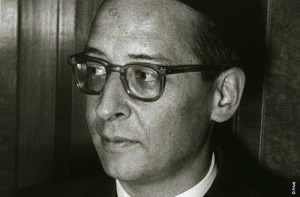
Wolf von Niebelschütz (24 januari 1913 – 22 juli 1960)
De Elzasser dichter en schrijver Maxime Alexandre werd geboren op 24 januari 1899 in Wolfisheim. Zie ook alle tags voor Maxime Alexandre op dit blog.
L’ombre
Dans le vent qui brise les jeux et les fleurs
Qui détruit les rêves et les charmes
Seul toujours seul je renvoie mon ombre
Seul
À l’affût du meilleur
Seul encore seul j’élève mon front sur le flot endormeur
Seul je m’interromps à calmer le cours du monde
Seul dans le vent
Seul dans la splendeur vivante
Plus près de moi-même
Plus loin de moi-même
Je n’ose plus imposer
Le silence pur
Ah le sein blanc et la chevelure de cristal
Les lueurs désespérées du rire
Encore seul
Seul à la lisière des plaines et du fleuve
Seul
Tout seul au hasard
Le voile déchiré
Dans les bosquets où règne la paresse
Dans le cœur nu comme les larmes
Les désirs rouges et bleus s’éveillent
Comme les jardins solennels de l’enfance
C’est la victoire du vent Une caresse
La danse des cheveux dans les colères
Un nuage La douceur cérémonieuse d’une fleur
Visage et ciel de la gloire
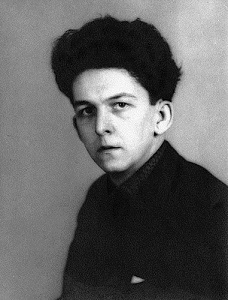
Foto door Man Ray, 1923
